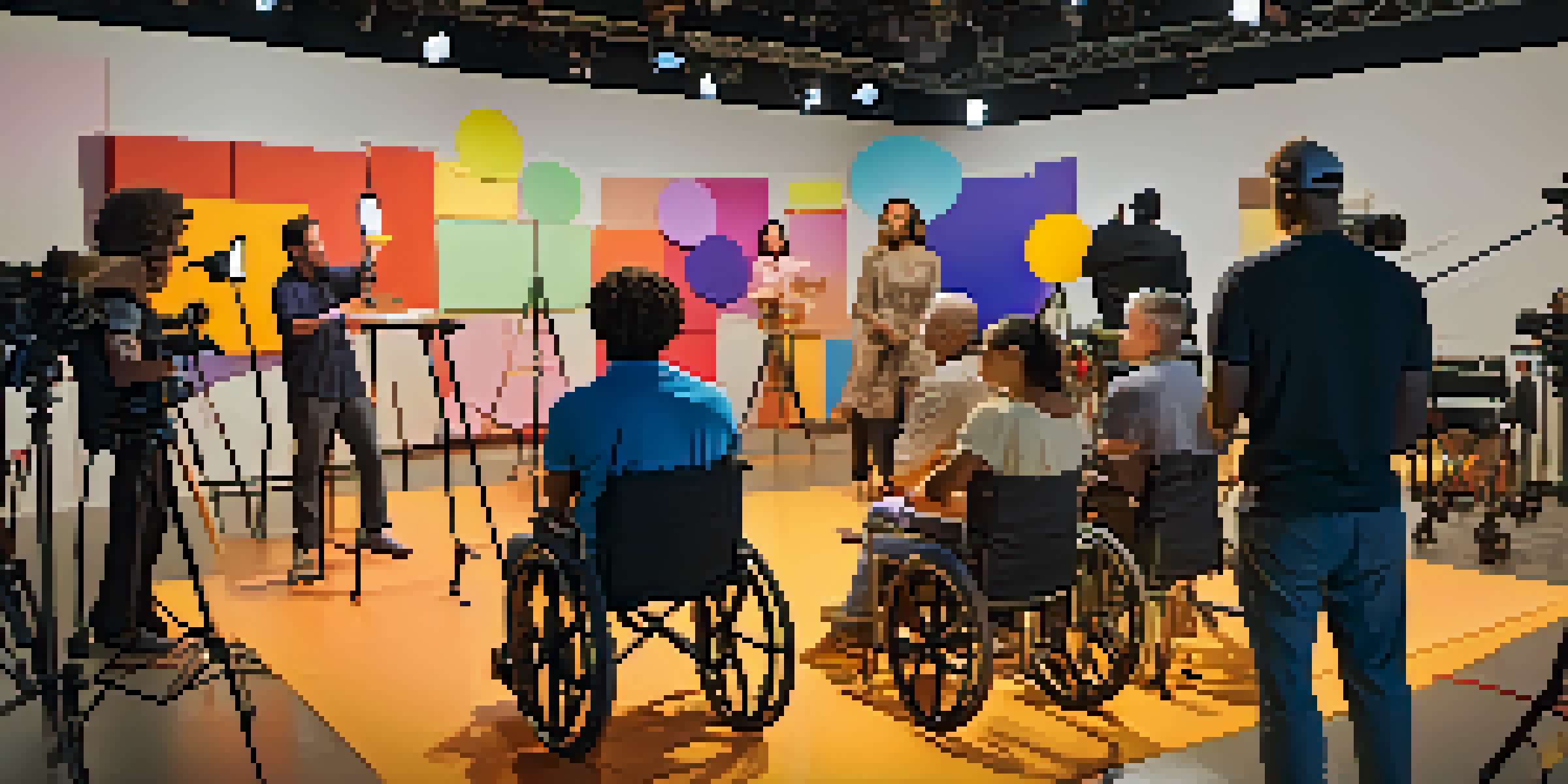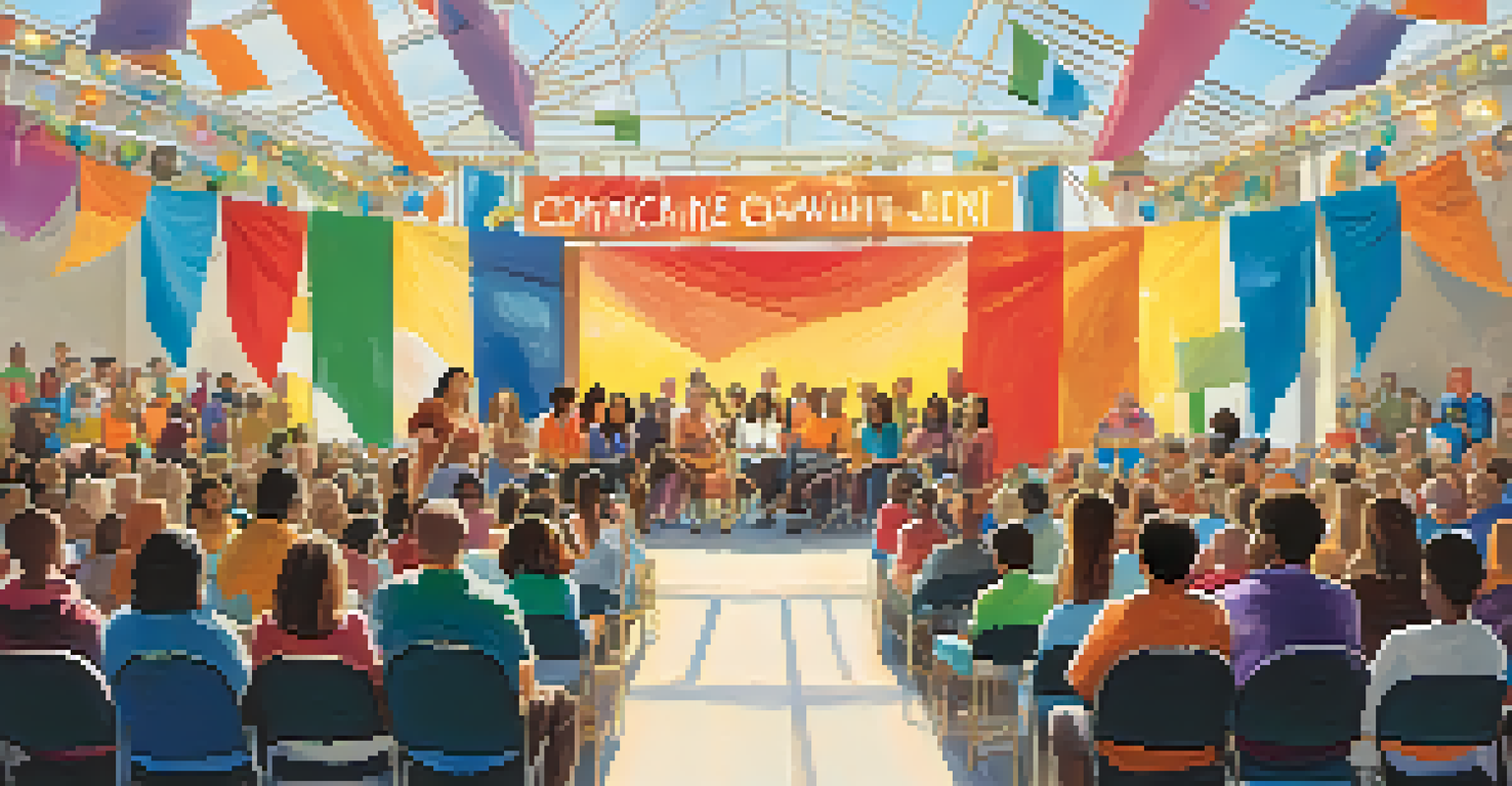Disability Visibility: Progress and Challenges in Hollywood

The Importance of Disability Visibility in Film
Visibility in media plays a crucial role in shaping societal perceptions. When people with disabilities are represented authentically, it helps break down stereotypes and fosters understanding. This visibility allows audiences to see the diversity of experiences and challenges faced by individuals with disabilities, making their stories more relatable.
Representation matters. It’s important for people with disabilities to see themselves reflected in the media.
Moreover, representation can empower those with disabilities by providing role models and a sense of belonging. When characters with disabilities take center stage, it sends a strong message that their narratives are valid and worthy of attention. This empowerment can lead to increased self-esteem and confidence among viewers who share similar experiences.
Ultimately, promoting disability visibility in film is not just about representation; it's about inclusion. When Hollywood embraces diverse stories, it enriches the narrative landscape, allowing for a more comprehensive understanding of humanity as a whole. This shift can inspire real change both on screen and off.
Recent Progress in Disability Representation
In recent years, Hollywood has made notable strides in representing disability through various projects. Films like 'The Upside' and 'A Quiet Place' showcase characters with disabilities in nuanced roles, challenging the often one-dimensional portrayals of the past. These films not only entertain, but they also spark conversations about disability, accessibility, and inclusion.

Additionally, the rise of streaming platforms has created opportunities for more diverse storytelling. Series like 'Special' and 'Crip Camp' have highlighted the experiences of disabled individuals, offering authentic perspectives that were previously underrepresented. This shift towards inclusivity reflects a growing awareness of the importance of diverse narratives in the entertainment industry.
Advocacy Drives Change
Organizations advocating for better representation in Hollywood play a crucial role in promoting authentic storytelling and inclusion of disabled individuals.
These advancements are encouraging, but they are just the beginning. The increased visibility of disability in Hollywood signals a positive trend, but continued advocacy is needed to ensure these stories are told authentically and responsibly.
The Challenges of Authentic Representation
Despite progress, challenges remain in achieving genuine representation of disability in Hollywood. A significant issue is the trend of able-bodied actors portraying disabled characters, which raises questions about authenticity and the missed opportunities for disabled performers. This practice not only perpetuates stereotypes but also limits the chances for actors with disabilities to showcase their talents.
When we tell authentic stories about disability, we break down barriers and build understanding.
Moreover, the narratives often focus on the disability itself rather than the individual's entire story. This can lead to a narrow understanding of disabled lives, reducing complex characters to mere plot devices. Audiences crave depth and authenticity, and it's essential that filmmakers recognize the richness of these stories beyond the disability.
Addressing these challenges requires a concerted effort from industry stakeholders, including casting directors, producers, and writers. By prioritizing authentic representation and creating spaces for disabled individuals in all facets of production, Hollywood can move towards a more inclusive future.
The Role of Advocacy Groups in Hollywood
Advocacy groups play a vital role in driving change within the film industry. Organizations such as the Ruderman Family Foundation and Disabled People’s Organizations actively campaign for better representation and inclusion of people with disabilities in Hollywood. Their efforts help raise awareness about the barriers faced by disabled actors and the importance of authentic storytelling.
These groups often provide resources and education to filmmakers, helping them understand the nuances of disability representation. By collaborating with industry professionals, they facilitate discussions that challenge existing norms and promote a more inclusive approach to casting and storytelling. This partnership can lead to more thoughtful portrayals and better representation of disabled communities.
Social Media Amplifies Voices
Platforms like Instagram and TikTok empower individuals with disabilities to share their stories and challenge stereotypes, influencing industry practices.
Ultimately, the work of advocacy groups is crucial in holding Hollywood accountable. As these organizations continue to push for change, they empower both creators and audiences to demand better representation and ensure that all voices are heard in the storytelling process.
The Impact of Social Media on Disability Visibility
Social media has emerged as a powerful tool in promoting disability visibility. Platforms like Instagram, Twitter, and TikTok allow individuals with disabilities to share their experiences, advocate for change, and connect with others who share similar challenges. This grassroots movement has sparked important conversations about representation and accessibility in Hollywood.
Moreover, social media enables disabled voices to be amplified beyond traditional media channels. Creators can showcase their talents, share their stories, and challenge stereotypes directly, bypassing gatekeepers in the industry. This democratization of storytelling has led to a richer landscape of narratives, offering audiences a more authentic glimpse into disabled lives.
As these conversations gain traction online, they influence industry practices and expectations. Filmmakers and producers are increasingly aware of the need to listen to and incorporate feedback from disabled communities, shaping a more inclusive and representative film industry.
The Future of Disability Representation in Hollywood
Looking ahead, the future of disability representation in Hollywood holds both promise and uncertainty. While there is a growing commitment to inclusivity, the challenge lies in maintaining momentum and ensuring that progress isn't just a trend. It will be essential for the industry to continue prioritizing authentic storytelling and diverse voices in the years to come.
Emerging filmmakers with disabilities are starting to make their mark, bringing fresh perspectives and unique narratives to the forefront. As these creators gain recognition, they can pave the way for a new wave of storytelling that accurately reflects the complexity of disabled experiences. This new generation can challenge the status quo and push for deeper, more authentic portrayals.
Disability Visibility Matters
Authentic representation in media helps break down stereotypes and fosters understanding of diverse experiences faced by individuals with disabilities.
However, it will require ongoing advocacy and collaboration between creators, industry leaders, and disabled communities. By fostering an environment of inclusivity and understanding, Hollywood can ensure that disability representation not only evolves but flourishes in the future.
Conclusion: Celebrating Progress While Acknowledging Challenges
In conclusion, the journey towards disability visibility in Hollywood has seen significant progress, yet challenges remain. The strides made in representation and storytelling are commendable, but the industry must continue to confront issues of authenticity and inclusivity. By prioritizing the voices of disabled individuals and ensuring their stories are told thoughtfully, Hollywood can create a more inclusive media landscape.
As audiences, we have the power to demand better representation and support projects that highlight disability experiences. By celebrating films and shows that authentically portray disabled lives, we contribute to a culture that values diversity and inclusivity. Engaging with these narratives allows us to learn, empathize, and grow as a society.

The road ahead may be complex, but with collective effort, advocacy, and a commitment to change, Hollywood can become a space where disability is celebrated, and all stories are recognized as valuable. Together, we can foster a future where everyone feels seen and heard in the world of film.